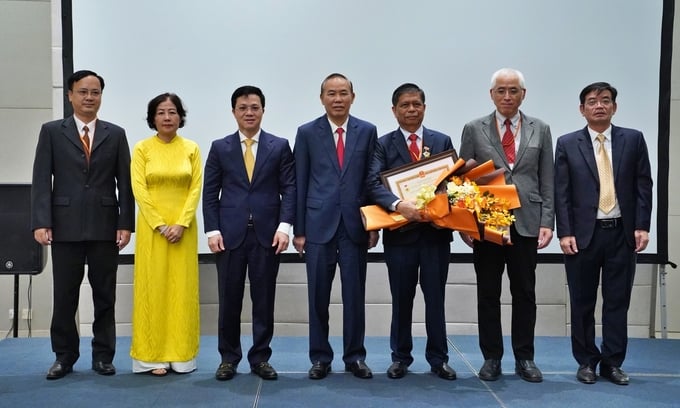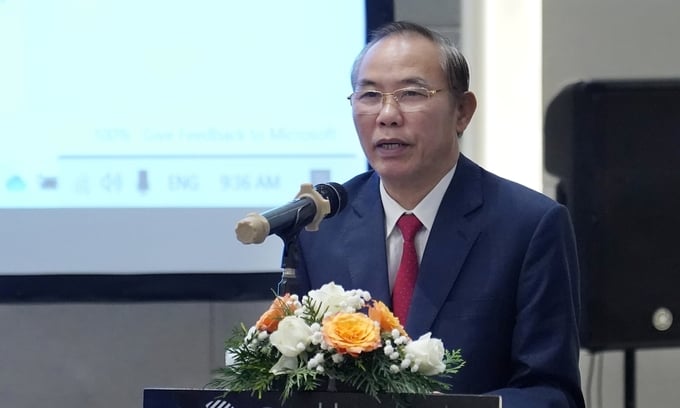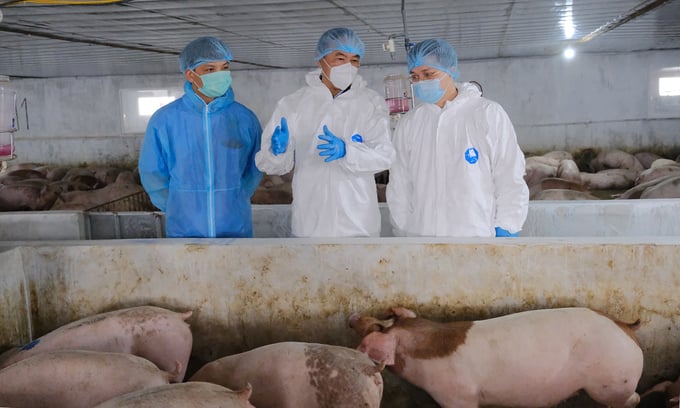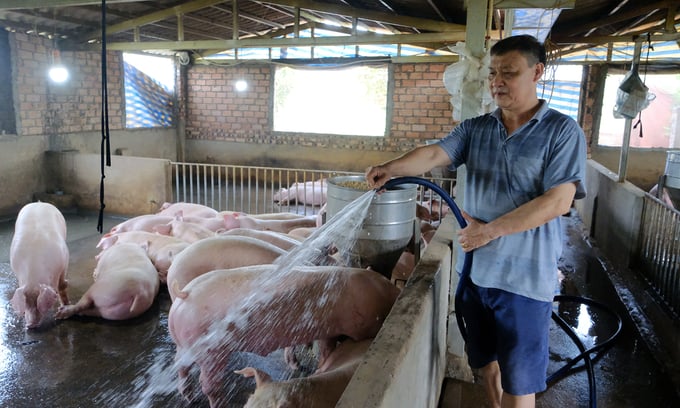December 23, 2025 | 21:25 GMT +7
December 23, 2025 | 21:25 GMT +7
Hotline: 0913.378.918
December 23, 2025 | 21:25 GMT +7
Hotline: 0913.378.918
In his opening remarks at the Coordination Meeting on African Swine Fever (ASF) in Southeast Asia, Deputy Minister of MARD, Mr. Phung Duc Tien, highlighted that Vietnam's pig population currently exceeds 30 million, ranking sixth globally. Pork also constitutes a major part of the Vietnamese diet, underscoring the importance of the swine industry in the country's food security and economy.

Deputy Minister of MARD, Mr. Phung Duc Tien congratulated Dr. Ronello Abila alongside leaders of the Department of Animal Health. Photo: Bao Thang.
The Vietnamese pig farming industry is currently facing significant challenges, particularly due to dangerous infectious diseases in pigs, with ASF being the most prominent.
According to Deputy Minister Phung Duc Tien, since ASF first appeared in February 2019, Vietnam has culled over 6 million pigs. As of early 2024, the country has reported 1,538 outbreaks across 48 provinces and cities, resulting in the death and culling of 88,258 pigs.
The Ministry of Agriculture and Rural Development has issued numerous directives and technical guidelines for ASF prevention and control. Notably, a national plan for ASF prevention and control for the 2020-2025 period has been proposed to the Government. Currently, the Ministry is working on a proposal for a Government Decree to provide support for the prevention and control of animal diseases, including ASF.
With the assistance of various international agencies and organizations, Vietnam has conducted extensive research, evaluations, and proposed solutions for ASF control. The most notable achievement has been the successful development and production of two commercial ASF vaccines, which are now being used domestically and exported to several countries.
At the workshop on the morning of November 26, Deputy Minister Phung Duc Tien expressed hope that participants would gain insights into the global and regional ASF situation, assess the risks associated with ASF, and explore preventive measures within Southeast Asia. He also encouraged the exchange of advantages, challenges, and practical lessons in ASF control efforts.

Deputy Minister Phung Duc Tien: "Collaboratively developing a strategic plan for ASF prevention in Southeast Asia." Photo: Bao Thang.
"We will collaborate to develop and implement a strategic plan for ASF prevention in Southeast Asia" emphasized Deputy Minister of MARD Mr. Phung Duc Tien. He called on stakeholders to swiftly agree on the essential components, target indicators, and evaluation measures for the strategic framework's effectiveness.
At the workshop, representatives from Southeast Asian countries reported varying ASF situations. For instance, Laos has not reported any outbreaks over the past two years. However, the Philippines, home to the second-largest pig population in the region after Vietnam experiencing a surge in ASF outbreaks in Q3 2024, with 2,620 reported cases. Officials from the Philippines highlighted that in August 2024, ASF infections peaked, with over 42% of pigs testing positive.
Experts from the World Organisation for Animal Health (WOAH) identified several causes of the outbreaks, including inconsistent animal disease control policies between central and local governments and the lack of a national animal product traceability system.
Karma Rinzin, WOAH Regional Animal Health Coordinator, noted that many areas in Southeast Asia still rely heavily on small-scale household farming. This reliance hinders disease control efforts and limits the adoption of biosecure livestock practices.
"Authorities and local governments need strategies to encourage the transition to large-scale farm operations. This would also facilitate access to resources from international organizations," he suggested.
Supporting this view, Ronello Abila, WOAH Representative for Southeast Asia, revealed that the organization is collaborating with regional countries to develop biosecure farming guidelines. A key direction is to plan large-scale livestock operations in designated areas away from residential zones. Additionally, pigs should be grouped by age and individually tagged. If any pig shows unusual symptoms, farm owners must immediately isolate it.

Deputy Minister Phung Duc Tien (center) along with Director of the Department of Animal Health Nguyen Van Long (right) visiting a pig farm on the outskirts of Hanoi. Photo: Bao Thang.
Praising the commercial ASF vaccine developed in Vietnam, Dr. Ronello Abila encouraged other countries to reference it, gather additional data, and hold more specialized conferences to assess its effectiveness and safety.
"ASF has spread across nearly the entire Southeast Asia region. However, over the past two years, the outbreak has shown signs of subsiding, with fewer cases being reported. Still, it remains a significant challenge that requires close cooperation among all countries in the region," the WOAH expert stated.
Speaking with Vietnam Agriculture Newspaper on the sidelines of the workshop, Ms. Arisara Choochern, from Thailand's Department of Livestock Development, shared that the country has established two monitoring systems to bolster biosecurity and animal health. Among them is the E-Smart system, an online platform launched in 2013, which serves as a central hub for animal health information.
In 2023, Thailand implemented surveillance of 12 animal diseases at farms, large slaughterhouses, and key transport routes. The main activities included monitoring the spread of ASF, foot-and-mouth disease, evaluating vaccine immunization effectiveness, and analyzing the risks of other severe and highly contagious diseases, such as mad cow disease.
"The E-Smart system enables citizens to report potential disease risks and receive feedback from experts or local veterinary officers following on-site inspections," Ms. Arisara explained. She added that data collected through the system undergoes rigorous verification at both provincial and regional levels to ensure high accuracy in monitoring efforts.

In Vietnam, household farming still accounts for a large proportion of livestock farming. Photo: Bao Thang.
From 2022 to 2024, Thailand reported a total of 114 ASF outbreaks across 35 provinces. In 2023 and 2024, outbreaks scattered in various locations throughout the country.
Due to this, in addition to implementing the electronic system, Thailand introduced an initiative to closely control disease outbreaks within a 1-kilometer radius. Under this initiative, any pig farm that reports unusual deaths or signs of infection is required to notify the veterinary hotline. Based on this information, local authorities will coordinate to implement emergency measures in the affected area.
"These efforts help Thailand detect and manage animal diseases early, while strengthening national biosecurity," Ms. Arisara observed. The veterinary expert also sees this as evidence of Thailand's strong commitment to protecting animal health, maintaining sustainable agricultural production, and minimizing the risk of disease spread.
On the morning of November 26, Deputy Minister Phung Duc Tien presented a commemorative medal to Dr. Ronello Abila, WOAH Representative for Southeast Asia, in recognition of his contributions to Vietnam's agriculture and rural development sector.
Expressing gratitude for the Filipino expert's support, Mr. Nguyen Van Long, Director of the Department of Animal Health, shared that when ASF first emerged in Vietnam, Dr. Abila directed the WOAH Regional Office to provide guidance documents and dispatched numerous expert teams to assist the country.
"Dr. Abila has served as a bridge, facilitating collaboration between WOAH, the Department of Animal Health, and U.S. experts to establish WOAH's international standards for evaluating commercial ASF vaccines," Director Nguyen Van Long noted.
Translated by Kieu Chi

(VAN) To support the Government in achieving Net Zero by 2050, Ha Tinh effectively disburses ERPA funds to forest owners.

(VAN) Geopolitical, climatic, and global market fluctuations are placing food security under significant pressure, while simultaneously pushing Vietnamese agriculture to adopt an ecosystem-based approach.

(VAN) The 2025 Joint Response Plan (JRP) identifies three core priorities and calls for $96.2 million to support disaster recovery for 1.4 million people.

(VAN) Risk assessment methodology enables early risk identification, rational resource allocation, and the development of control measures tailored to the food value chain.

(VAN) Once considered a waste product to be burned, rice straw in the Mekong Delta is now being collected and processed through mechanization and biotechnology, paving the way for a sustainable circular agricultural model.

(VAN) Risk assessment in food safety management not only helps protect public health but also promotes sustainable development.

(VAN) Prime Minister chaired the 26th meeting of the National Steering Committee on Illegal, Unreported, and Unregulated (IUU) Fishing.